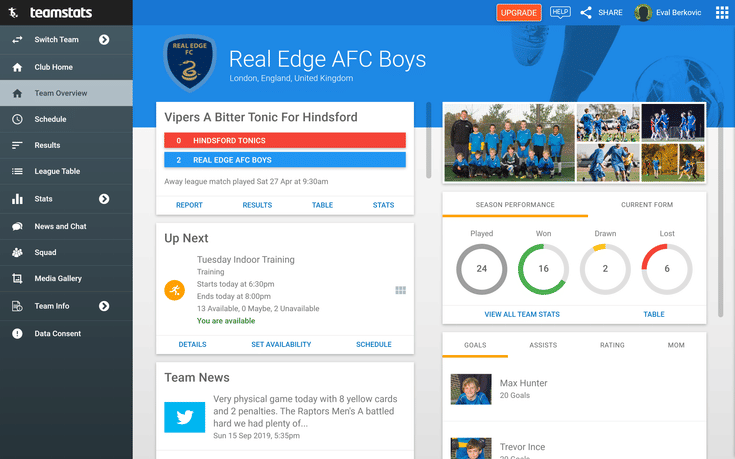The journey to becoming an effective football coach requires more than just a passion for the beautiful game. Across the United Kingdom, aspiring and experienced coaches alike are turning to specialised football coaching courses to enhance their skills and knowledge. These structured training programmes offer comprehensive instruction on technical skills, tactical approaches, and effective teaching methods that can transform an enthusiastic amateur into a qualified football mentor.
Football coaching courses cater to various experience levels, from beginners seeking foundational knowledge to advanced coaches looking to refine specific aspects of their training repertoire. They typically cover essential elements such as demonstration techniques, error detection and correction, and practical methods for increasing player participation and engagement. Many courses also address the critical aspects of player safety and development appropriate for different age groups.
In today's competitive environment, certification through recognised coaching programmes has become increasingly valuable for those serious about their coaching career. These courses not only provide the technical knowledge needed to develop players effectively but also offer insights into the psychological aspects of coaching that help motivate teams to perform at their best. While some Americans might refer to the sport as "soccer," in the UK these coaching qualifications are respected credentials that open doors at clubs and academies across all levels of the football pyramid.
Exploring Football Coaching Essentials
Football coaching requires a blend of technical knowledge, leadership skills, and strategic thinking. Effective coaches understand both the historical evolution of coaching methodologies and the multifaceted responsibilities that come with the position.
History and Evolution of Football Coaching
Football coaching has transformed dramatically since the sport's early organisation in 19th century Britain. Initially, coaching was informal and player-led, with minimal tactical sophistication. The 1930s marked a turning point when Herbert Chapman at Arsenal introduced innovative formations and specialised training methods.
Post-war developments saw the emergence of professional coaching qualifications. The FA introduced structured coaching courses in the 1960s, creating pathways for aspiring coaches to develop their skills methodically.
The modern era has witnessed exponential growth in coaching education. Digital technology has revolutionised how knowledge is shared, with online courses complementing traditional face-to-face learning.
Today's coaching landscape integrates sports science, psychology, and data analysis. The UEFA coaching licence structure provides a standardised progression route from grassroots to elite levels.
Role and Responsibilities of a Football Coach
A football coach wears multiple hats beyond simply directing training sessions. Primary responsibilities include:
Technical Development:
- Designing age-appropriate training sessions
- Teaching fundamental skills and techniques
- Implementing tactical systems and strategies
Leadership Functions:
- Motivating players and building team cohesion
- Setting clear expectations and standards
- Managing match-day decisions and substitutions
Effective coaches balance player development with competitive results. At grassroots levels, coaches focus on creating inclusive environments where participants develop both technical abilities and love for the game.
Communication skills are paramount, with coaches needing to adapt their approach for different age groups. Modern coaches must also stay current with evolving tactics and training methodologies through continuous professional development.
Safeguarding responsibilities have become increasingly important, especially when working with youth players. The best coaches recognise they influence not just footballing ability but character development too.
Football Coaching Course Curriculum
Modern football coaching courses offer comprehensive curricula designed to develop well-rounded coaches capable of nurturing player talent at all levels. These programmes cover essential aspects of coaching from technical fundamentals to advanced psychological concepts.
Technical Skills Development
Technical skills form the foundation of any football coaching course. Participants learn how to teach fundamental techniques such as passing, shooting, dribbling, and first touch. Courses typically include practical demonstrations of training drills and progressive skill-building exercises suitable for different age groups.
Most programmes emphasise the importance of repetition and proper technique correction. Coaches learn how to break down complex movements into manageable components for effective teaching.
Video analysis tools are often incorporated to help coaches identify technical flaws and develop correction strategies. Many courses include session planning frameworks that focus on specific technical elements.
The best technical modules provide coaches with age-appropriate drills that can be easily adapted to match varying player abilities. They also emphasise creating game-realistic scenarios where players can apply technical skills under pressure.
Tactical Knowledge Enhancement
Tactical understanding transforms a group of skilled players into a cohesive team. Coaching courses cover formations, playing styles, and strategic principles adapted to different age groups and competitive levels.
Coaches learn to analyse games and identify tactical patterns, strengths and weaknesses. This includes understanding space creation, defensive organisation, transitions, and set-piece strategies.
Small-sided games feature prominently as tools for teaching tactical concepts. Courses typically provide frameworks for progressive tactical development from 5-a-side to 11-a-side formats.
Key tactical elements covered:
- Principles of attack and defence
- Positional responsibilities
- Game phases and transitions
- Match analysis techniques
- Opposition scouting methods
Advanced courses often utilise tactical boards and software to illustrate complex concepts. They may also include case studies of successful tactical approaches from professional football.
Physical Conditioning and Nutrition
Effective coaching courses address the physical demands of football and how to prepare players appropriately. This includes age-specific conditioning protocols, injury prevention strategies, and recovery methods.
Coaches learn to design training sessions that develop endurance, strength, speed, and agility relevant to football performance. Many courses incorporate the latest sports science research on periodisation and training load management.
Nutrition guidance covers match-day fuelling, hydration strategies, and general dietary principles for optimal performance. This knowledge helps coaches provide basic nutritional advice to players of all ages.
Courses emphasise safeguarding player welfare through proper warm-up routines and monitoring fatigue. They often include guidance on growth-related considerations for youth players, including how training intensity and volume should be modified during developmental stages.
Psychology and Player Management
The psychological dimension of coaching is increasingly recognised as crucial in player development. Quality coaching courses cover motivation techniques, communication skills, and team-building strategies.
Coaches learn how to create positive learning environments that encourage player creativity and decision-making. This includes understanding different learning styles and adapting coaching approaches accordingly.
Many courses address managing competitive pressure, developing mental toughness, and building player confidence. They also cover strategies for effective feedback delivery and goal-setting frameworks.
Essential psychological components:
- Team cohesion building
- Individual player motivation
- Stress management techniques
- Conflict resolution
- Parent communication strategies
Advanced courses may incorporate basic sports psychology principles that help coaches understand performance anxiety, concentration, and emotional regulation. The soccer/football distinction is also addressed to help British coaches communicate effectively with international players.
Certification and Career Progression in Coaching
Football coaching certification provides a structured pathway for aspiring coaches to develop their skills and advance their careers. Professional recognition through formal qualifications enhances credibility and opens doors to more prestigious coaching opportunities.
Types of Coaching Certifications
The FA Coaching Pathway offers several qualification levels for football coaches in the UK. The entry-level FA Level 1 in Coaching Football provides foundational knowledge for those beginning their coaching journey.
FA Level 2 builds upon these basics with more technical and tactical understanding. For those pursuing more advanced careers, UEFA B, A, and Pro Licences represent increasingly prestigious qualifications recognised throughout Europe.
Specialised certifications are also available for specific aspects of coaching:
- Goalkeeping coaching qualifications
- Youth module awards for working with different age groups
- Futsal coaching certificates
- Disability football qualifications
Many professional clubs also recognise the Scottish FA and Welsh FA coaching pathways, providing alternative certification routes.
Navigating the Career Pathway
Most coaching careers begin at grassroots level with youth teams or local amateur clubs. Entry-level positions typically require the FA Level 1 qualification, which covers basic coaching principles and safeguarding.
Progression often follows a pattern:
- Volunteer coaching at community clubs
- Part-time paid coaching positions
- Academy or development coaching roles
- First-team coaching at higher competitive levels
Networking plays a crucial role in advancement. Attending coaching forums, professional development events, and maintaining relationships with established coaches can lead to career opportunities.
Building a coaching portfolio with documented sessions, match analyses, and player development records demonstrates professional competence to potential employers.
Continued Education and Advancement
Continuous professional development (CPD) is essential for coaching advancement. The FA requires coaches to complete CPD hours to maintain their qualifications and stay current with evolving coaching methodologies.
Professional development opportunities include:
- FA Licensed Coaches' Club membership
- Training workshops and seminars
- Online coaching courses and webinars
- Mentoring programmes with experienced coaches
Many coaches supplement their football-specific qualifications with related disciplines. Sports science, psychology, and strength and conditioning certifications can provide a competitive edge in the coaching market.
Universities now offer football coaching degrees and diplomas, combining theoretical knowledge with practical experience. These academic qualifications can be particularly valuable for coaches seeking positions at professional academies or in the educational sector.
Integrating Technology in Football Coaching
Modern football coaching has evolved beyond traditional training methods to embrace technological innovations that enhance player development and team performance. These advancements provide coaches with valuable insights that were previously unavailable through conventional observation alone.
Innovations in Coaching with GIS
Geographic Information Systems (GIS) technology has revolutionised how football coaches analyse player movement and positioning. These sophisticated tracking systems use GPS sensors embedded in players' vests to record distances covered, sprint frequencies, and positional data during training and matches.
Leading clubs now utilise GIS to create heat maps showing player movements and team formations, helping coaches identify tactical strengths and weaknesses. This technology allows for personalised training regimens based on each player's physical capabilities and position-specific requirements.
GIS technology has become more accessible to grassroots clubs, with affordable options available for amateur teams. The data collected helps prevent injuries by identifying when players are reaching fatigue thresholds, enabling coaches to adjust training loads accordingly.
Data Analysis and Decision Making
The modern football coach increasingly relies on data analytics to inform tactical decisions and player development strategies. Video analysis platforms with AI capabilities can automatically identify key moments in matches, saving coaches countless hours of manual review.
Performance metrics such as passing accuracy, pressing efficiency, and expected goals provide objective measures of individual and team performance. Coaches can use these insights to develop targeted training sessions addressing specific weaknesses identified through data analysis.
Mobile applications now enable even amateur coaches to capture and analyse performance data without expensive equipment. Players benefit from receiving clear, evidence-based feedback rather than purely subjective assessments.
Many coaching courses now include modules on interpreting and applying data in training contexts. This statistical approach complements traditional football knowledge, creating a more comprehensive coaching methodology that balances the art and science of the beautiful game.
Show less











